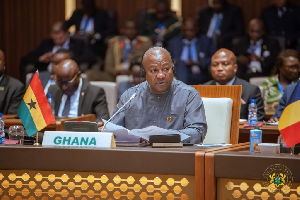 President John Dramani Mahama
President John Dramani Mahama
The African Union Executive Council has approved the establishment of two new reparations bodies.
This represents a turning point in Africa’s pursuit of historical justice.
Speaking at the opening of the 13th High-Level Dialogue on Democracy and Human Rights on Tuesday, President John Dramani Mahama disclosed that the AU has approved terms of reference for both the African Union Commission of Experts on Reparations and the African Union Reference Group of Legal Experts on Reparations.
“I wish to commend the African Union Executive Council for approving the terms of reference for the African Union Commission of Experts on Reparations and the African Union Reference Group of Legal Experts on Reparations. These are decisive milestones,” the President said.
The president emphasised that the approval represents just the beginning, calling for immediate action to transform the bodies from paper institutions into active agents of change.
He said, the continent “must now move swiftly to operationalize these instruments” and empower the bodies with “the resources, visibility and mandate to lead us on this noble journey of truth, justice and restitution.”
He warned delegates that the new reparations bodies must not become “another declaration left on paper” but rather function as “a living mandate for action.”
He positioned the new institutions as essential tools for addressing what he called the “enduring legacies of slavery, colonial exploitation, systemic racism and economic subjugation” that continue to shape African states.
He stated that these historical injustices remain visible today in “arbitrary borders that divide our peoples,” “financial hardships imposed by unjust global systems,” and “fragile governance systems” that African nations are still struggling to strengthen.
The president argued that the reparations bodies will play a central role in restoring “African agency, sovereignty and dignity” and building governance systems “informed by our context, shaped by our people and owned by our African communities.”
According to the president, the establishment of these bodies comes at a defining moment when Africa’s citizens – particularly young people – are growing increasingly impatient with ceremonial gestures over concrete action.
He stated that Africa’s youth majority is “not asking for charity” but demanding “fairness” and “opportunity,” making the operationalization of reparations institutions more urgent than ever.
He declared that the new bodies must rise to meet these expectations, telling delegates that “our citizens are watching and waiting” for results rather than rhetoric.
The president said the institutions will work within the broader context of the AU’s declared “Decade of Reparations” spanning 2026-2036, representing a sustained continental commitment to addressing historical injustices.
The High-Level Dialogue continues through the week as African leaders work to define the specific mandates and operational frameworks for the newly approved reparations bodies.
